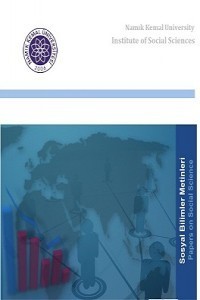Covid-19 Pandemisinin Kamu ve Katılım Bankalarının Sukuk (Kira Sertifikaları) İhraçları Üzerindeki Etkisi
COVİD-19 pandemisi tüm dünyada finansal ve ekonomik hayatı olumsuz bir şekilde etkilemiştir. COVİD-19 salgın sürecinde kamu (T.C. Hazine ve Maliye Bakanlığı) ve katılım bankaları tarafından ihraç edilen sukuk (kira sertifikaları) üzerinde pandeminin etkisinin ne düzeyde olduğu bu çalışmada araştırılmıştır. Ayrıca çalışmada Gayri Safi Yurtiçi Hasıla (Gdp), faiz oranı, enflasyon ve döviz kurunun sukuk üzerindeki etkisi analiz edilmiştir. Bu amaca yönelik 2015/01-2021/12 dönemlerine ait aylık veriler kullanılarak panel veri analizi yöntemi kullanılmıştır. İlgili veriler Türkiye Katılım Bankaları Birliği (TKBB), Türkiye İstatistik Kurumu (TUİK) ve Türkiye Cumhuriyet Merkez Bankası (TCMB)’nden temin edilmiştir. Analiz sonuçlarına göre sukuk ihraçlarının pandemi döneminde güvenli bir liman olma özelliği gösterdiği ve bu dönemde olumsuz etkilenmediği görülmüştür. Bunun yanında gdp, faiz oranı ve döviz kurunun sukuk gelişimini olumlu yönde; enflasyonun ise sukuk gelişimini olumsuz yönde etkilediği sonucuna ulaşılmıştır.
Anahtar Kelimeler:
İslami Finans, Katılım Finans, Kira Sertifikaları, Sukuk, Panel Veri Analizi
The Effect Of The Covıd-19 Pandemıc On Sukuk (Leasing Certıfıcates) Of Publıc And Partıcıpatıon Banks
The COVID-19 pandemic has adversely affected financial and economic life around the world. In this study, the effect of the pandemic on sukuk (leasing certificates) issued by the public (T.C. Ministry of Treasury and Finance) and participation banks during the COVID-19 pandemic process was investigated. In addition, the effect of gross domestic product (GDP), interest rate, inflation, and exchange rate on sukuk was analyzed in the study. For this purpose, the panel data analysis method was used by using monthly data for 2015/01-2021/12. The relevant data were obtained from the Participation Banks Association of Turkey (TKBB), the Turkish Statistical Institute (TUIK), and the Central Bank of Turkey Republic (TCMB). According to the results of the analysis, it was seen that sukuk issuances were a safe harbour during the pandemic period and were not adversely affected during this period. In addition, the GDP, interest rate, and exchange rate positively affect the development of sukuk. It was concluded that inflation negatively affected the development of sukuk.
___
- Adekoya, O. B., Akinseye, A. B., Antonakakis, N., Chatziantoniou, I., Gabauer, D., & Oliyide, J. (2022). Crude oil and Islamic sectoral stocks: Asymmetric TVP-VAR connectedness and investment strategies. Resources Policy, 78, 102877.
- Akhtar, S., & Jahromi, M. (2017). Impact of the global financial crisis on Islamic and conventional stocks and bonds. Accounting & Finance, 57(3), 623-655.
- Al-raeai, A. M., Zainol, Z., & Rahim, A. (2018). The Role of Macroeconomic Factors on Sukuk Market Development of Gulf Cooperation Council (GCC) Countries. International Journal of Economics and Financial Issues, 8(3), 333-339.
- Aman, A. U., Naim, A. M., Isa, M. Y., & Ali, S. E. A. (2021). Factors affecting sukuk market development: Empirical evidence from sukuk issuing economies. International Journal of Islamic and Middle Eastern Finance and Management, ahead-of-print(ahead-of-print).
- Ben Khelifa, S., & Arsi, S. (2022). Islamic equity funds and stock market: Dynamic relation and market timing during the COVID-19 outbreak. Journal of Economic and Administrative Sciences. https://doi.org/10.1108/JEAS-08-2021-0173.
- Cherif, M., & Gazdar, K. (2010). Institutional and Macroeconomic Determinants of Stock Market Development in Mena Region: New Results From a Panel Data Analysis. International Journal of Banking and Finance, 7(1), 139-159.
- Hasan, Md. B., Hassan, M. K., Rashid, Md. M., & Alhenawi, Y. (2021). Are safe haven assets really safe during the 2008 global financial crisis and COVID-19 pandemic? Global Finance Journal, 50, 100668. https://doi.org/10.1016/j.gfj.2021.100668
- Hasan, Md. B., Rashid, Md. M., Shafiullah, M., & Sarker, T. (2022). How resilient are Islamic financial markets during the COVID-19 pandemic? Pacific-Basin Finance Journal, 74, 101817. https://doi.org/10.1016/j.pacfin.2022.101817
- Naeem, M. A., Billah, M., Marei, M., & Balli, F. (2022). Quantile connectedness between Sukuk bonds and the impact of COVID-19. Applied Economics Letters, 29(15), 1378-1387. https://doi.org/10.1080/13504851.2021.1934384
- Shear, F., & Ashraf, B. N. (2022). The performance of Islamic versus conventional stocks during the COVID-19 shock: Evidence from firm-level data. Research in International Business and Finance, 60, 101622. https://doi.org/10.1016/j.ribaf.2022.101622
- Uddin, M. H., Kabir, S. H., Kabir Hassan, M., Hossain, M. S., & Liu, J. (2022). Why do sukuks (Islamic bonds) need a different pricing model? International Journal of Finance & Economics, 27(2), 2210-2234. https://doi.org/10.1002/ijfe.2269
- Zhang, W., Zhuang, X., Wang, J., & Lu, Y. (2020). Connectedness and systemic risk spillovers analysis of Chinese sectors based on tail risk network. The North American Journal of Economics and Finance, 54, 101248. https://doi.org/10.1016/j.najef.2020.10124
- ISSN: 1308–4453/1308–4895
- Yayın Aralığı: Yılda 2 Sayı
- Başlangıç: 2008
Sayıdaki Diğer Makaleler
Covid-19 Pandemisinin Türkiye’deki Elektronik Ödeme Sistemleri Üzerine Etkisi
Aysel ŞAHİN KAYA, Filiz DİLEK, Nura ARABACIOĞLU
Osmanlı Sanayileşmesinde Sanayi Mekteplerinin Önemi: Dersaadet Sanayi Mektebi Örneği
Fikriye Ceren BOSTANCI, Selçuk KOÇ
Endüstriyel Kalkınma ve Çevresel Kuznets Eğrisi: Ergene Havzası Üzerine Bir Vaka Çalışması
